#roman version of the medusa story
Text
oh fuckkkkk from medusa telling annabeth “i was you” last episode to annabeth facing life-endangering consequences for percy’s actions (which i completely support btw) just like medusa faced athena’s ire for poseidon’s actions but nothing goes the same way because percy takes accountability immediatly (“i was the one who sent her head to olympus”) and also saves annabeth by sacrificing his ownself and all of this happens in athena’s fucking TEMPLE.
I AM GOETH INSANETH
#percy jackon and the olympians#percy jackson#percy pjo#pjo#pjo fandom#pjo series#pjo tv show#pjo tv adaptation#walker scobell#pjo tv series#percabeth#annabeth chase#roman version of the medusa story#poseidon
7K notes
·
View notes
Text
I hate when I see people hating on the gods because of PJO, it makes me so sad and angry
Also. The amount of people calling the female gods "a bitch" is insufferable. First of all, lazy insult, second of all, these characters are fucking ancient. They have years of history in them. You can't just think of their character as "a bitch". NOT EVEN THE BITCH, JUST A BITCH — AS IN, AN INSULT
#see i'm okay w ppl insulting their favs as a joke#i do it too#but (n it might just be me loving these characters) watching ppl insult them bc they hate them is#it's just so weird to me#like#i'm not explaining myself well-#calling the character out on all the shit they've done (the gods have done some very fucked up stuff) is okay#i love to do that. criticizing my favorite stuff is one of my favorite hobbies#the problem is when ppl treat their character like absolute garbage without knowing anything about them#“athena is a bitch who supports SA 👿👿” they say when SHE IS NOT???#HER CURSING MEDUSA BC SHE WAS SAd IS ONLY ONE VERSION OF THE MYTH#and (as far as i'm aware) it's the roman version of the myth too! so not even the og#also the greeks have some very bad history w SA. bc of the way they treated women#like have you ever actually read about the greek gods? they SA people all the time#and that's what i like to see ppl shit on them for#idk if i said that right#i like to see people shitting on them for that while still knowing that they're very deep characters#w interesting stories that were made in a time where that kind of stuff was normalized#this also goes for the “u can't like the greek gods bc they've SAd women!” ppl#i don't like them as PEOPLE buddy#i like them as characters bc they are fictional and interesting and fucking ANCIENT#did i said fictional already?#anyway. it is 2024 cut it out w the greek god hate#greek mythology#Greek gods#the olympians#pjo#percy jackon and the olympians#rrverse#avis' post
2 notes
·
View notes
Text
The truth about Medusa and her rape... Mythology breakdown time!
With the recent release of the Percy Jackson television series, Tumblr is bursting with mythological posts, and the apparition of Medusa the Gorgon has been the object of numerous talks throughout this website… Including more and more spreading of misinformation, and more debates about what is the “true” version of Medusa’s backstory.
Already let us make that clear: the idea that Medusa was actually “blessed” or “gifted” by Athena her petrifying gaze/snake-hair curse is to my knowledge not at all part of the Antique world. I still do not know exactly where this comes from, but I am aware of no Greek or Roman texts that talked about this – so it seems definitively a modern invention. After all, the figure of Medusa and her entire myth has been taken part, reinterpreted and modified by numerous modern women, feminist activist, feminist movements or artists engaged in the topic of women’s life and social conditions – most notably Medusa becoming the “symbol of raped women’ wrath and fury”. It is an interesting reading and a fascinating update of the ancient texts, and it is a worthy take on its own time and context – but today we are not talking about the posterity, reinvention and continuity of Medusa as a myth and a symbol. I want to clarify some points about the ACTUAL myth or legend of Medusa – the original tale, as told by the Greeks and then by the Romans.
Most specifically the question: Was Medusa raped?
Step 1: Yes, but no.
The backstory of Medusa you will find very often today, ranging from mythology manuals (vulgarization manuals of course) to Youtube videos, goes as such: Medusa was a priestess of Athena who got raped by Poseidon while in Athena’s temple, and as a result of this, Athena punished Medusa by turning her into the monstrous Gorgon.
Some will go even further claiming Athena’s “curse” wasn’t a punishment but a “gift” or blessing – and again, I don’t know where this comes from and nobody seems to be able to give me any reliable source for that, so… Let’s put this out of there.
Now this backstory – famous and popular enough to get into Riodan’s book series for example – is partially true. There are some elements here very wrong – and by wrong I do mean wrong.
The story of Medusa being raped and turned into a monster due to being raped does indeed exist, and it is the most famous and widespread of all the Medusa stories, the one people remembered for the longest time and wrote and illustrated the most about. Hence why Medusa became in the 20th century this very important cultural symbol tied to rape and the abuse of women and victim-blaming. HOWEVER – the origin of this story is Ovid’s Metamorphoses, from the first century CE or so. Ovid? A Roman poet writing for Roman people. “Metamorphoses”? One of the two fundamental works of Roman literature and one of the two main texts of Roman mythology, alongside Virgil’s Aeneid. This is a purely Roman story belonging to the Roman culture – and not the Greek one. The story of Medusa’s rape does not have Greek precedents to my knowledge, Ovid introduced the element of rape – which is no surprise given Ovid turned half of the romances of Greek mythology into rapes. Note that, on top of all this, Ovid wasn’t even writing for religious purposes, nor was his text an actual mythological effort – he wrote it with pure literary intentions at heart. It is just a piece of poetry and literature taking inspiration from the legends of the Greek world, not some sort of sacred text.
Second big point: The legend I summarized above? It isn’t even the story Ovid wrote, since there are a lot of elements that do not come from Ovid’s retelling of the story (book fourth of the Metamorphoses). For example Ovid never said Medusa was a priestess of Athena – all he said was that she was raped in the temple of Athena. I shouldn’t even be writing Athena since again, this is a Roman text: we are speaking of Minerva here, and of Neptune, not of Athena or Poseidon. Similarly, Minerva’s curse did not involve the petrifying gaze – rather all Ovid wrote about was that Minerva turned Medusa’s hair into snakes, to “punish” her because her hair were very beautiful, and it was what made her have many suitors (none of which she wanted to marry apparently), and it is also implied it is what made Neptune fall in love (or rather fall in lust) with her. I guess it is from this detail that the reading of “Athena’s curse was a gift” comes from – even though this story also clearly does victim-blaming of rape here.
But what is very fascinating is that… we are not definitively sure Neptune raped Medusa in Ovid’s retelling. For sure, the terms used by Ovid in his fourth book of Metamorphoses are clear: this was an action of violating, sexually assaulting, of soiling and corrupting, we are talking about rape. But Ovid refers several other times to Medusa in his other books, sometimes adding details the fourth-book stories does not have (the sixth book for examples evokes how Neptune turned into a bird to seduce Medusa, which is completely absent from the fourth book’s retelling of Medusa’ curse). And in all those other mentions, the terms to designate the relationship between Medusa and Neptune are more ambiguous, evoking seduction and romance rather than physical or sexual assault. (It does not help that Ovid has an habit of constantly confusing consensual and non-consensual sex in his poems, meaning that a rape in one book can turn into a romance in another, or reversal)
But the latter fact makes more sense when you recall that the rape element was invented and added by Ovid. Before, yes Poseidon and Medusa loved each other, but it was a pure romance, or at least a consensual one-night. Heck, if we go back to the oldest records of the love between Poseidon and Medusa, back in Hesiod’s Theogony, we have descriptions of the two of them laying together in a beautiful, flowery meadow – a stereotypical scene of pastoral romances – with no mention of any brutality or violence of any sort. As a result, it makes sense the original “romantic” story would still “leak” or cast a shadow over Ovid’s reinvented and slightly-confused tale.
Step 2: So… no rape?
Well, if we go by Greek texts, no, apparently Medusa was not raped in Greek mythology, and only became a rape victim through Ovid.
The Ancient Greek texts all record Poseidon and Medusa sleeping with each other and having children, but no mention of rape. And the whole “curse of Athena” thing is not present in the oldest records – no temple of Athena soiling, no angry Athena cursing a poor girl… “No curse?” you say “But then how did Medusa got turned into a Gorgon”? Answer: she did not. She was born like that.
As I said before, the oldest record of Medusa’s romance but also of her family comes from Hesiod’s Theogony (Hesiod being one of the two “founding authors” of Greek mythology, alongside Homer – Homer did wrote several times about Medusa, but only as a disembodied head and as a monster already dead, so we don’t have any information about her life). And what do we learn? That Medusa is part of a set of three sisters known as the Gorgons – because oh yes, Ovid did not mention Medusa’s sister now did he? How did Medusa’s sisters ALSO got snake-hair or petrifying-gaze if only Medusa was cursed for sleeping with Neptune? Ovid does not give us any answer because again, it is an “adaptational plot hole”, and the people that try to adapt Ovid’s story have to deal with the slight problem of Stheno and Euryale needing to share their sister’s curse despite seemingly not being involved in the whole Neptune business. Anyway, back to the Greek text.
So, you have those three Gorgon sisters, and Medusa is said to be mortal while her sisters are not. Why is it such a big deal? Because Medusa wasn’t originally some random human or priestess. Oh no! Who were the Gorgons’ parents? Phorcys and Keto/Ceto, aka two sea-gods. Not just two sea-gods – two sea-gods of the ancient, primordial generation of sea-gods, the one that predated Poseidon, and that were cousins to the Titans, the sea-gods born of Gaia mating with Pontos.
So the Gorgons were “divine” of nature – and this is why Medusa being a mortal was considered to be a MASSIVE problem and handicap for her, an abnormal thing for the daughter of two deities. But let’s dig a bit further… Who were Phorcys and Ceto? Long story short: in Greek mythology, they were considered to be sea-equivalents of Typhon and Gaia. They were the parents of many monsters and many sea-horrors: Keto/Ceto herself had her name attributed and equated with any very large creature (like whales) or any terrifying monster (like dragons) from the sea. The Gorgons themselves was a trio of monsters, but their sisters, that directly act as their double in the myth of Perseus? The Graiai – the monstrous trio of old women sharing one eye and one tooth. Hesiod also drops the fact that Ladon (the dragon that guarded the golden apples of the Hesperids), and Echidna (the snake-woman that mated with Typhon and became known as the “mother of monsters”) were also children of Phorcys and Ceto, while other authors will add other monster-related characters such as Scylla (of Charybdis and Scylla fame), the sirens, or Thoosa (the mother of Polyphemus the cyclop). Medusa herself is technically a “mother of monsters” since she birthed both Pegasus the flying horse and Chrysaor, a giant. So here is something very important to get: Medusa, and the Gorgons, were part of a family of monsters. Couple that with the absence of any mention of curses in these ancient texts, and everything is clear.
Originally Medusa was not a woman cursed to become a monster: she was born a monster, part of a group of monster siblings, birthed by monster-creating deities, and she belonged to the world of the “primordial abominations from the sea”, and the pre-Olympian threats, the remnants of the primordial chaos. It is no surprise that the Gorgons were said to live at the edge of the very known world, in the last patch of land before the end of the universe – in the most inhuman, primitive and liminal area possible. They were full-on monsters!
Now you might ask why Poseidon would sleep with a horrible monster, especially when you recall that the Greeks loved to depict the Gorgons as truly bizarre and grotesque. It wasn’t just snake-hair and petrifying gaze: they had boar tusks, and metallic claws, and bloated eyes, and a long tongue that constantly hanged down their bearded chin, and very large heads – some very old depictions even show her with a female centaur body! In fact, the ancient texts imply that it wasn’t so much the Gorgon’s gaze or eyes that had the power to turn people into stone – but that rather the Gorgon was just so hideous and so terrifying to look at people froze in terror – and then literally turned into stone out of fear and disgust. We are talking Lovecraftian level of eldritch horror here. So why would Poseidon, an Olympian god, sleep with one of these horrors? Well… If you know your Poseidon it wouldn’t surprise you too much because Poseidon had a thing for monsters. As a sort of “dark double” of Zeus, whereas Zeus fell in love with beautiful princesses and noble queens and birthed great gods and brave heroes, Poseidon was more about getting freaky with all sorts of unusual and bizarre goddesses, and giving birth to bandits and monsters. A good chunk of the villains of Greek mythology were born out of Poseidon’s loins: Polyphemus, Antaios, Orion, Charybdis, the Aloads… And even his most benevolent offspring has freaky stuff about it – Proteus the shapeshifter or Triton half-man half-fish… So yes, Poseidon sleeping with an abominable Gorgon is not so much out of character.
Step 3: The missing link
Now that we established what Medusa started out as, and what she ended up as… We need to evoke the evolution from point Hesiod to point Ovid, because while people summarized the Medusa debate as “Sea-born monster VS raped and punished woman”, there is a third element needed to understand this whole situation…
Yes Ovid did invent the rape. But he did not invent the idea that Medusa had been cursed by Athena.
The “gorgoneion” – the visual and artistic motif of the Gorgon’s head – was, as I said, a grotesque and monstrous face used to invoke fright into the enemies or to repel any vile influence or wicked spirit by the principle of “What’s the best way to repel bad stuff? Badder stuff”. Your Gorgon was your gargoyle, with all the hideous traits I described before – represented in front (unlike all the other side-portraits of gods and heroes), with the face being very large and flat, a big tongue out of a tusked-mouth, snake-hair, bulging crazy eyes, sometimes a beard or scales… Pure monster. But then… from the fifth century BCE to the second century BCE we see a slow evolution of the “gorgoneion” in art. Slowly the grotesque elements disappear, and the Gorgon’s face becomes… a regular, human face. Even more: it even becomes a pretty woman’s face! But with snakes instead of hair. As such, the idea that Medusa was a gorgeous woman who just had snakes and cursed-eyes DOES come from Ancient Greece – and existed well before Ovid wrote his rape story.
But what was the reason behind this change?
Well, we have to look at the Roman era again. Ovid’s tale of Medusa being cursed for her rape at the hands of Neptune had to rival with another record collected by a Greek author Apollodorus, or Pseudo-Apollodorus, in his Bibliotheca. In this collection of Greek myths, Apollodorus writes that indeed, Medusa was cursed by Athena to have her beautiful hair that seduced everybody be turned into snakes… But it wasn’t because of any rape or forbidden romance, no. It was just because Medusa was a very vain woman who liked to brag about her beauty and hair – and had the foolish idea of saying her hair looked better than Athena’s. (If you recall tales such as Arachne’s or the Judgement of Paris, you will know that despite Athena being wise and clever, one of her main flaws is her vanity).
“Wait a minute,” you are going to tell me, “The Bibliotheca was created in the second century CE! Well after Greece became part of the Roman Empire, and after Ovid’s Metamorphoses became a huge success! It isn’t a true Greek myth, it is just Ovid’s tale being projected here…” And people did agree for a time… Until it was discovered, in the scholias placed around the texts of Apollonios of Rhodes, that an author of the fifth century BCE named Pherecyde HAD recorded in his time a version of Medusa’s legend where she had been cursed into becoming an ugly monster as punishment for her vanity. We apparently do not have the original text of Pherecyde, but the many scholias referring to this lost piece are very clear about this. This means that the story that Apollodorus recorded isn’t a “novelty”, but rather the latest record of an older tradition going back to the fifth century BCE… THE SAME CENTURY THAT THE GORGONEION STARTED LOSING THEIR GROTESQUE, and that the face of Medusa started becoming more human in art.
[EDIT: I also forgot to add that this evolution of Medusa is also proved by strange literary elements, such as Pindar's mention in a poem of his (around 490 BCE) of "fair-cheeked Medusa". A description which seems strange given how Medusa used to be depicted as the epitome of ugliness... But that makes sense if the "cursed beauty" version of the myth had been going around at the time!]
And thus it is all connected and explained. Ovid did invent the rape yes – but he did not invent the idea of Athena cursing Medusa. It pre-existed as the most “recent” and dominating legend in Ancient Greece, having overshadowed by Ovid’s time the oldest Hesiodic records of Medusa being born a monster. So what Ovid did wasn’t completely create a new story out of nowhere, but twist the Greek traditions of Athena cursing Medusa and Medusa having a relationship with Poseidon, so that the two legends would form one and same story. And this explains in retrospect why Ovid focuses so much on describing Medusa’s beautiful hair, and why Ovid’s Minerva would think turning her hair into snake would be a “punishment fit for the crime”: these are leftovers of the Greek tale where Medusa was punished for her boasting and her vanity.
CONCLUSION
Here is the simplified chronology of how Medusa’s evolution went.
A) Primitive Greek myths, Hesiodic tradition: Born a monster out of a family of sea-monsters and monstrous immortals. Is a grotesque, gargoylesque, eldritch abomination. Athena has only an indirect conflict with her, due to being Perseus’ “fairy godmother”. Has a lovely romance with Poseidon.
B) Slow evolution throughout Classical Greece and further: Medusa becomes a beautiful, human-looking girl that was cursed to have snake for hair and petrifying eyes, instead of being a Lovecraftian horror people could not gaze upon. Her conflict with Athena becomes direct, as it is Athena that cursed her due to being offended by her vain boasting. Her punishment is for her vanity and arrogant comparison to the goddess.
C) Ovid comes in: Medusa’s romance with Poseidon becomes a rape, and she is now punished for having been raped inside Athena’s temple.
[As a final note, I want to insist upon the fact that the story of Medusa being raped is not less "worthy" than any other version of the myth. Due to its enormous popularity, how it shaped the figure of Medusa throughout the centuries, and how it still survives today and echoes current-day problems, to try to deny the valid place of this story in the world of myths and legends would be foolish. HOWEVER it is important to place back things in their context, to recognize that it is not the ONLY tale of Medusa, that it was NOT part of Greek mythology, but rather of Roman legends - and let us all always remember this time Poseidon slept with a Lovecraftian horror because my guy is kinky.]
EDIT:
For illustration, I will place here visuals showing how the Ancient art evolved alongside Medusa's story.
Before the 5th century BCE: Medusa is a full-on monster



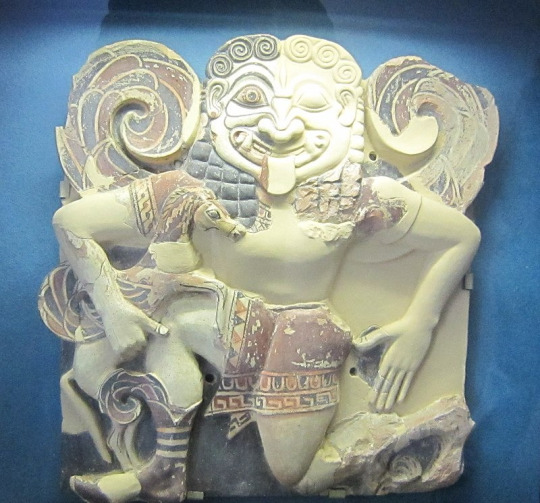


From the 5th century to the 2nd century BCE: A slow evolution as Medusa goes from a full-on monster to a human turned into a monster. As a result the two depictions of the grotesque and beautiful gorgoneion coexist.
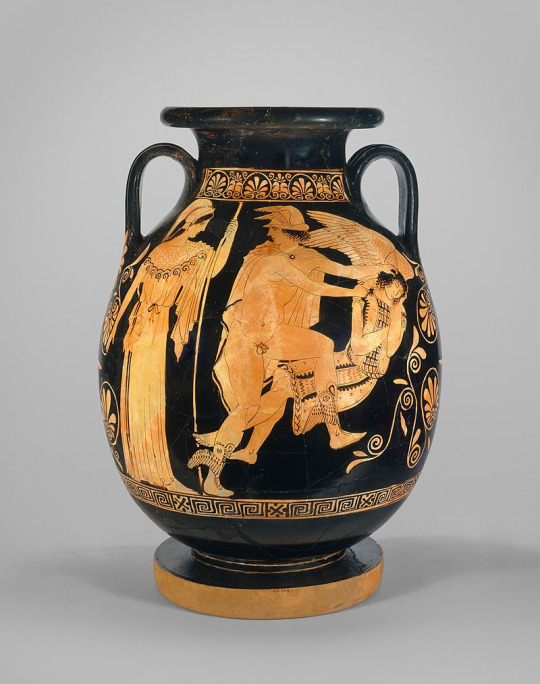


Post 2nd century BCE: Medusa is now a human with snake hair, and just that


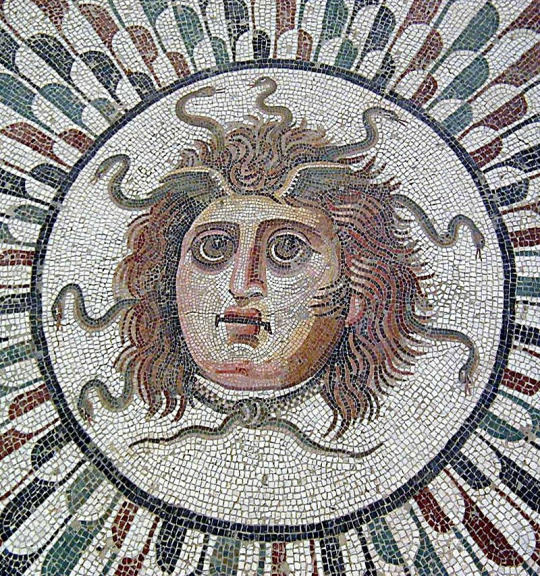
#greek mythology#medusa#gorgon#athena#gorgons#poseidon#neptune#minerva#ovid#rape in mythology#greek monsters#roman mythology
4K notes
·
View notes
Text
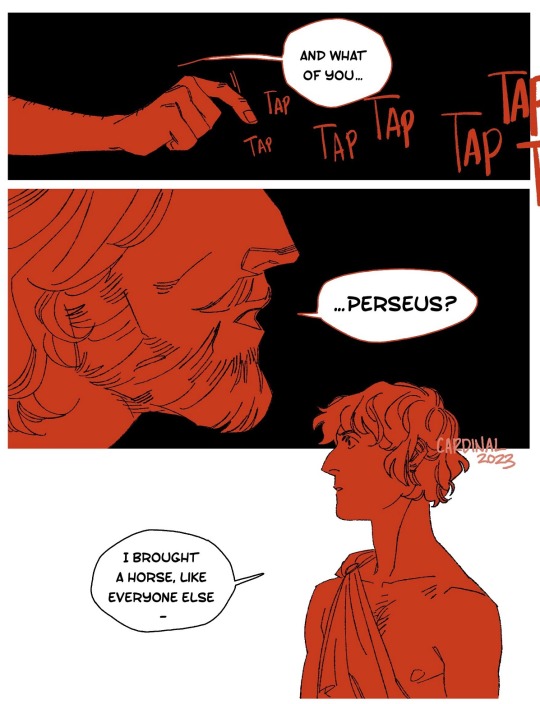
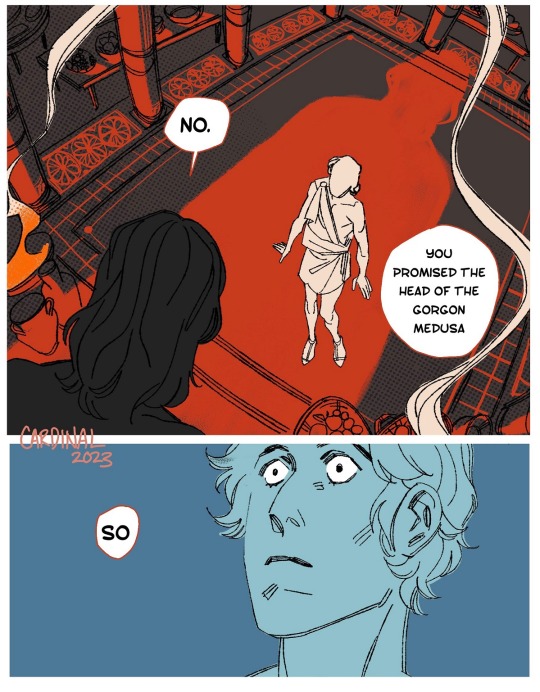
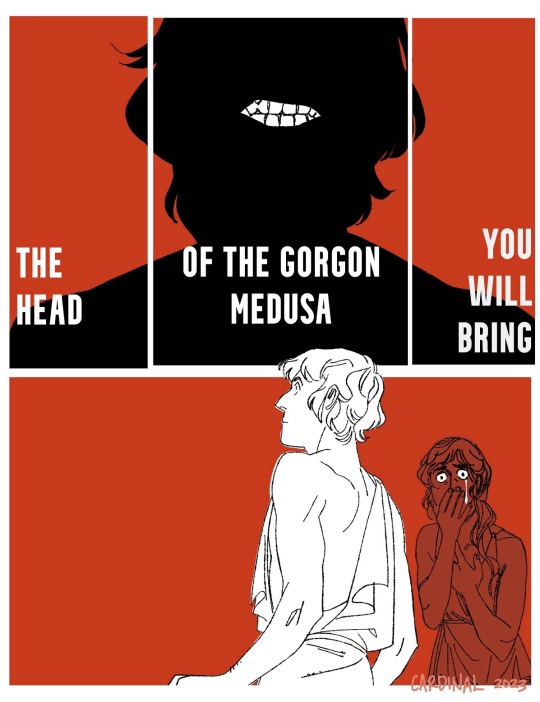
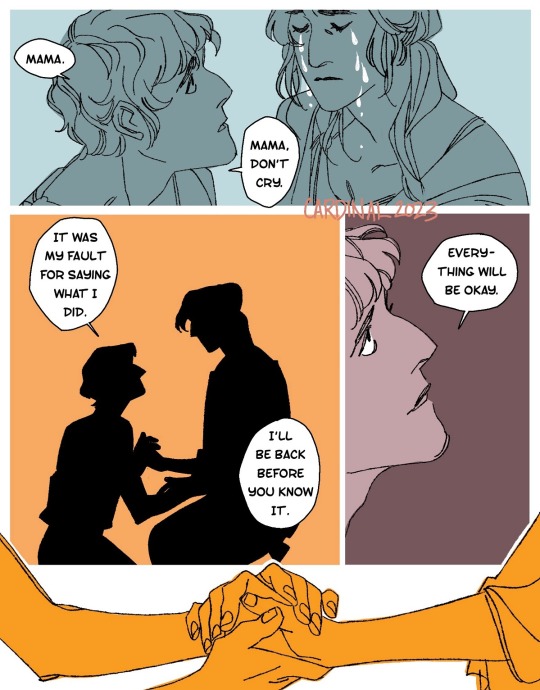
something. about. the horror of being sent on an impossible (death) quest and obligations and hospitality politics. the trauma of not having a home, and then the trauma of being in a house that becomes actively hostile to you, one that would swallow you whole and spit out your bones if you step out of line. all of this is conditional, your existence continues to be something men want gone.
it's about going back as far as I can with the perseus narrative because there's always a version of a myth that exists behind the one that survives. the missing pieces are clearly defined, but the oldest recorded version of it isn't there! and there's probably something older before that!! but it's doomed to forever be an unfilled space, clearly defined by an outline of something that was there and continues to be there in it's absence.
and love. it's also about love. even when you had nothing, you had love.
on the opposite side of the spectrum, this is Not About Ovid Or Roman-Renaissance Reception, Depictions And Discourses On The Perseus Narrative.
edit: to add to the above, while it's not about Ovid, because I'm specifically trying to peel things back to the oldest version of this story, Ovid is fine. alterations on the Perseus myth that give more attention Medusa predate Ovid by several centuries. this comic is also not about those, either! there are many versions of this story from the ancient world. there is not one singular True or Better version, they're all saying something.

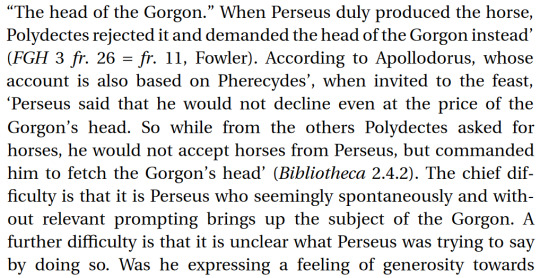
Perseus, Daniel Ogden

Anthology of Classical Myth: Primary Sources in Translation, edited & translated by Stephen M Trzaskoma, R. Scott Smith, Stephen Brunet
#it's all greek to me#perseus#danae#komiks tag#long post#every other week i start to say something about how greek heroes are a good case study in diaspora and exile trauma#but man perseus makes me so sad. so does danae. she loves her son :(#perseus turning a whole island to stone is a huge mood. i would also do that if i were him#anyway (salutes) take care everyone i gotta watch yunho's new video it looks like a fucking movie im so excited#(i singled out ovid bc i remember the fucking shit perseus discourse that ran through this site. i remember#im preemptively loading a gun and pointing at it before it can touch this post#it hasn't died out either i see it on twitter all the time in the most ANNOYING ways possible i am TIRED#esp bc they're actually doing medusa a narrative disservice like congrats! you made it worse! stop telling me it's better!!!!)
6K notes
·
View notes
Text
I stg if I see one more "Justice for medusa's TRUE story!" post I'm gonna kill someone.
(TW: Assault mention)
The medusa is assaulted by posidon then cursed by athena for being assaulted in her temple only appears in Ovid's Metamorphoses, which is written as a purposeful subversion of Greco-roman myths. most are reframed or rewritten from just kinda a thing that exists or a black and white moral tale of why you shouldn't be hubristic to full on tragedies on the part of the person often getting their comeuppance or the monster. Heck in book 13 we get a love story starring Polyphemus, the cyclops from the Odyssey.
In general mythology, Medusa is just another monster. Ovid revises the myth to turn it into a tragedy. I absolutely love ovid's work, he does so many clever things with the myths, but for the love of the gods its the furthest from the real version you can get
#And yeah obviously its greek mythology so theres no set canon and you can kind of pick and choose tellings#but Ovid's one isn't a tradition of belief its just literature#its damn good literature but in terms of religion its like claiming good omens is part of the christian canon#classics#ancient history#tagamemnon#ancient rome#greek mythology#medusa#ovid#latin literature#ancient greece#mythology
407 notes
·
View notes
Note
If you're still doing prompts, may I suggest Danny learning about the legends following his time travel (what the Romans thought was up; the Buddhists, that one kid, etc
Physics and engineering major or not, Danny still needed credits in the humanities. Comparative Mythology and Folklore was the obvious choice for that. All through high school, Sam and Jazz had been on his case about knowing so little mythology, on account of his ghostly enemies and allies sometimes being mythological figures.
(Also the constellation thing, but they didn't bring that part up all that much, funnily enough.)
At the time, Danny had figured (see what he did there?) that there wasn't much point to it. Pandora wasn't all that similar to her mythic version, Medusa didn't turn people to stone, and winged horses were, by and large, not friendly.
Recent events had made him reconsider that stance.
Anyway! The class was a "two birds, one stone" sort of deal. He got both credits and practical knowledge. Theoretically.
So far, they'd covered creation myths and etiological stories, gods and goddesses, the monolith and the hero's journey, and now, in the tiny slice of time before they had to start studying for the final, they were looking at weird minor similarities without clear causes.
"Now," said the professor, "this next one is probably my favorite, because it's so specific and so widespread. Of course, the most obvious reason for this is that it's a story that traveled, much like how the pre-Indo-European gods traveled. However, the times and locations involved make that very unlikely, at least in my opinion. The other end of the spectrum is, of course, aliens, which are even more unlikely."
There was a soft smattering of laughter throughout the large classroom. Danny started to get a bad feeling about this.
"The other strange thing about this particular similarity is that it comes out of seemingly nowhere, with regards to the larger culture. There have even been several instances of it in this century - although, given modern information infrastructure, those instances may not be entirely organic. But Imperial Rome, China, Colonial America, just to name a few… That's weirder. Any guesses about what I'm talking about?"
No one raised their hand, and after a couple of minutes, the professor used their remote control to go to the next slide of their presentation. Danny sank down in his seat as he stared up at a collage of himself in a dozen different art styles.
"All around the world, there are stories about a young man or boy with white hair and dark clothing coming from 'distant lands' to either fight off 'monsters' or to retrieve unspecified objects. As you can see, despite some of these pieces being from cultures that never had any contact with one another, the resemblance of the figures is striking. The– Yes, you have a question?"
"Will this be on the final?" asked a student a few rows down from Danny.
The professor sighed. "As a general rule, if I'm teaching you about it, I'll be testing you about it. Moving on–"
Danny forced himself to start taking notes. He couldn't believe he was going to be tested on himself. Especially when he was pretty sure he hadn't even been to all of those places yet.
Clockwork must be laughing his head off.
430 notes
·
View notes
Text
On Medusa from the PJO TV Show: A Survivor and complicated antagonist
I'm not the only one obsessed with the version of Medusa and I know it.
She's beautiful, she's eerily calm, she says, "I am a survivor," and you feel that. She is the symbol for women out there who don't want to be bullied anymore, and more recently Medusa's head has become a symbol of women fighting back with the #MeToo movement.
But I'm not writing this to talk about Medusa as the Gorgon from the Greek mythos. I'm here to talk about how she was written in the PJO TV Show. So let's get into it, shall we?
Note that some ideas from this meta are expanded on from this Variety article where the writers of the show and Rick and Rebecca Riordan, speak about the changes they made from the book to show adaptation.
A victim of an abuse of power
In the Variety article, Rick says, “There are many versions from ancient times of what happened in that temple with Medusa and Poseidon and Athena. Who’s to blame? Who’s the abuser? What’s the real story? It’s fiction, but it certainly is important to acknowledge that there is abuse involved here. Abuse of power.”
Like in all Greek myths, there is never exactly one "correct" version of a story. In many, Medusa and Poseidon basically have a one-night stand. In some, they have a mutual affair. In others, it's Poseidon who seduces Medusa into Athena's temple, and in others still, Medusa is a victim of assault.
What most versions of the myths do have in common is the fact that Medusa and Poseidon had some sort of relationship that produced at least two children (Pegasus and Chrysaor). Most versions (both Greek and Roman) also depict her as a tragic figure and a beautiful maiden.
Athena is involved in earlier myths as the goddess who put her head onto the shield that averts the gaze of enemies. In later myths, she is the one who curses Medusa to transform into what we know of her today after Athena discovers her relationship with Poseidon on her sacred ground. Poseidon, of course, gets let off scot-free.
Depending on how you read into the myths, there could be a variety of different things happening here. So, I like what the show did. They made it vague enough that this is still middle-grade level like the books, but they also expanded on what the books couldn't because they are originally written from 12-year-old Percy's POV.
They basically keep nearly all aspects of the story and original myth possible. But in the end, Medusa is indeed a victim of abuse.
Her real curse is not that she is hideous and turns people who look into her eyes into stone, but that she is made invisible by the curse and she is not heard. Not one person can look her in the eye and live to tell the tale. She can't show her beauty, so she chooses to live with what she has. Even with a slanted hat covering half her face and eyes, you can tell she's statuesque (see what I did there?) and a beauty.
She chooses elegant clothes, pretty jewelry, a neat hairstyle, a hat that accents what you can see of her features, and red lipstick that makes you think she could be desirable.
But it doesn't change the fact that Poseidon had his way with her, told her he loved her, and then she was the only one left with the punishment for what happened between them. Athena cursed her out of anger.
Medusa revered Athena who is a virgin goddess, and of course, Athena would be upset when one of her devout followers is suddenly not a virgin too. Yet, Medusa mentioned earlier in her narrative in episode 3 that Athena never answered her prayers at all and never gave an indication that she was listening. So out of all the times she pays attention, it's to curse her for something she doesn't like?
Athena paid attention to Medusa when it was convenient to her and Poseidon left her when Medusa was no longer useful to him after she was cursed.
This version of Medusa is left to the wolves to defend herself and live with herself, a victim of abuse of power from multiple ends and from gods she thought she could trust.
Medusa and Sally Jackson
What I found the most interesting in episode 3 was the fact that Medusa sprinkles the seeds of doubt into Percy's mind that maybe the loving relationship he thought his mother had with Poseidon was not what actually happened.
In the Variety article, Rebecca Riordan says, that Percy has to think ‘What has my father done? Has he changed? How do I see myself in relationship to that?' while Rick says that “Percy can only judge his father by the wreckage he has left behind."
The fact of the matter is, Percy is 12. The book series is for a middle-grade audience, and the show is too. So people out there thinking "This could've been darker!" need to calm down and take a back seat. The books always did a good job of introducing deeper, darker topics to children. The show should stick to the same strategy to keep what made the original story so good.
But, what the show does here is make you think. If Poseidon could abandon Medusa like that, use her like that, then maybe Sally Jackson was abandoned and used too.
Her show story does a good job of connecting two women who had a relationship with the same god, connecting women who thought they could trust someone but were left to fend for themselves.
Look at where Sally Jackson is now at this point in the story. Not only was she forced to marry Gabe Ugliano to use his stench to protect her son who attracts monsters, but he is an abusive man both to her and to her son at least verbally. In the books, it's not suggested until the very end of The Lightning Thief that Gabe has been hitting her outside of Percy's POV. I've seen people forget that and immediately write off that Gabe wasn't "abusive enough". C'mon people. Just because Sally fights back verbally doesn't mean he wasn't still abusive in his actions in the first two episodes. Even if they decide not to suggest that he was also physically abusive to Sally, doesn't make him sneakily using her phone, demanding to ask why she has to use his car, and demanding for her to make food for him any less abusive.
Sally chose that life because the most important person in the world to her is her son, and even though Gabe is a total jerk, she convinced herself that she could take what he gave her because what he did to her was better than having her son being hunted and maimed by a bunch of Greek monsters because of who he is. To top it all off, now Hades stole her away into the Underworld.
Medusa, in a similar way, was left to fend for herself. She chose what was best for her, and lived in her new form because she could not change what had happened. She wants to save Sally too because she sees Percy as a boy whose mom was abused the same way she was.
Medusa's brilliant role as an antagonist
Now we're here, the main reason I wanted to write this giant thing. I saw a weird take on Twitter saying that Medusa in the show should not have been beheaded like she was in the books because then that negates her whole story and what she stood for.
Well, in my opinion, that is a shallow take on what the show's Medusa is trying to portray.
Medusa is an antagonist. In the myths, she is an antagonist. In the books, she is an antagonist. In the show, she is an antagonist. She gets in the way of Percy's path for his quest, she suggests that he doesn't need Annabeth and Grover, and that only she can save his mom with him.
In both the books and the show, there are hundreds of statues of people she had turned. Sure, some of them could've been attacking her, but there were a lot of people there who were victims too. I'm sure that screaming lady didn't mean to do something to Medusa, and Grover's Uncle Ferdinand? He was the only statue who appeared calm and collected and there was nothing to suggest that he was out to get her. He was only on his journey to find Pan.
Medusa has killed people, and innocent people at that. For thousands of years. And not just people she had to, and not a small amount. Then, she suggests that Percy let her kill his two friends who are children.
To her, Annabeth and Grover are dead weight because of their loyalty to the gods. Annabeth wants to be noticed by her mother. Grover wants to make sure the world doesn't end. I mean, they all don't want the world to end but I digress.
Medusa hates the gods. She wants to save a woman who is like her. She will protect that woman's child. But she will do anything and destroy anyone to get that end result.
A victim is still a victim even if they are a villain or an antagonist. Her methods don't make her any less of a victim of abuse. But that doesn't mean they are right.
So yes, when Percy runs away from her to keep his friends alive and she takes off her hat to stalk them around the room to turn them into stone, she does indeed need to be beheaded. There is literally no other way to defeat her. They can't look at her or they die. So they have to make her stop moving.
Unfortunately, a person like her with deep and complicated motivations would never change their mind when they feel they are betrayed. So, Percy did what he could to protect himself and his friends from dying.
Still, it's a poetic death as it is in the books. He mails her head to the gods and mentions Athena specifically for her punishment of Medusa. He's impertinent.
Medusa didn't deserve to be punished. But it's been millennia and she made her choices. The abusers did not get the punishment they deserved, but maybe now they will. Medusa's head in her (temporary) death, will be a testament to her victory, but also a testament to her downfall.
#pjo meta#percy jackon and the olympians#pjo#percy jackson and the olympians#pjo tv show#pjo tv show spoilers#medusa#percy#annabeth chase#grover underwood#sally jackson#poseidon#meta
226 notes
·
View notes
Text
To every new person in the Greek myth fandom who shits on Athena because of what she did to Medusa....
Can y'all like..... Idk maybe NOT take Ovid's Metamorphoses as your ONLY source of Medusa's origin story?? (Furthermore that version isn't Greek either, it's Roman. So it's not Athena anyway, it's Minerva in that case).
And maybe like... Idk look at the GREEK myths (where Medusa didn't HAVE a traumatic backstory) that PRECEDE Ovid's version?? Would really not hurt you to look at and/or consider more than just one interpretation of the story.
PS: This is NOT to say that you CAN'T consider Ovid's version at all. You can, but atleast don't consider only THAT version to be canon. Cuz it's not. Myths like this don't follow a linear path. They are branched into several different versions. And cherry-picking only one of them while actively pretending the other versions don't exist at all is not gonna help you in your theological development.
#greek mythology#mythology#greek myths#ancient greek mythology#greek myth#greek myth retellings#ovid#ovid's metamorphoses#metamorphoses#medusa#athena#athena goddess of wisdom#greek gods#greek goddess#greek goddesses#ancient greek#greek god#minerva
159 notes
·
View notes
Text

so this might be a bit of reach but this scene had been bothering me for a while because why tf was sally jackson’s face not visible for the first few dialogues??? the initial answers i could think of were: a dramatic reveal or showing us young percy’s limited perspective on things, both literally and more figuratively.
but then i started thinking of how medusa tells percy that sally and her are kinda like sisters and how their stories have similarities and then my mind decided to connect sally’s head not being visible when she's first introduced to medusa being eventually beheaded, not only as a foreshadowing but also as an ominous warning of what could have been sally’s fate in an adjacent alternate universe if things didn’t go the way they had.


they have this entire conversation with the same angle, the same shot, with percy talking with a headless sally and then when they finally reveal her fully, THIS is the shot and THIS is the dialogue:

i mean percy and sally are roughly alligned with perseus and medusa’s head in the statue, a sort of twisted parallel of myth and reality.
i don't even care if this wasn't how it was intended but it seems intentional to me and i really adore this show’s cinematography and subtle hints through imaging and motifs and wkiqpwodkqlfk just had to get this out somewhere.
#percy jackon and the olympians#percy jackson#percy pjo#pjo#pjo fandom#pjo series#pjo tv show#pjo tv adaptation#walker scobell#pjo tv spoilers#pjo tv series#sally jackson#medusa#perseus#greek mythology#roman version of the medusa story
2K notes
·
View notes
Text
VERY fascinated by the shows interpretation of Medusa. For one it’s wildly different from the books sure, but what’s fascinating to me is the version of Medusa they chose. They chose Abed’s Metamorphosis instead of the traditional Greek story. In Greek she’s just a monster, born that way. But in Abed’s version (a very Roman version fyi) Poseidon and Athena have sex in Athena’s temple and she is changed by Athena.
But something interesting that stood out to me is the way Medusa tells it. In her version, or rather the one she tells, the sex was consensual and Athena was slighted. But in the original… Medusa was assaulted. Whether or not the transformation was victim blaming or victim protecting… Medusa shifts back and forth on that. But what she is trying to do is prevent the sins of the past from repeating. Shes a woman scorned by the gods, ignored and abandoned, and she takes it out on a ton of innocents in her attempt to force the gods to see justice…
She’s a hell of a lot like Luke.
130 notes
·
View notes
Text
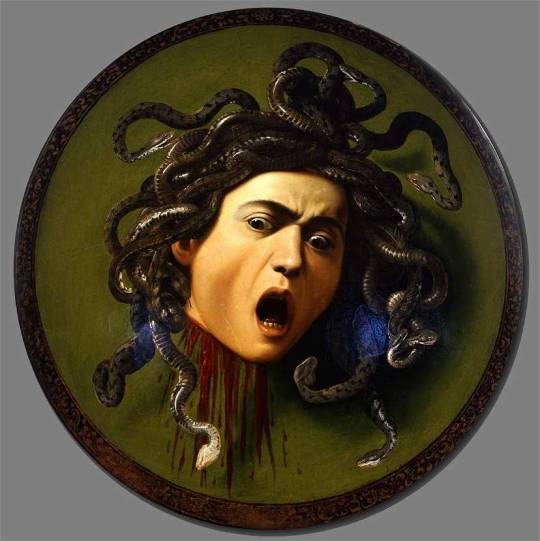
Michelangelo Merisi da Caravaggio | Medusa, 1597
Cardinal del Monte commissioned Caravaggio to paint two versions of Medusa. Both paintings were gifts to the Grand Duke of Tuscany, Ferdinando I de Medici, who presumably had a taste for all things gruesome. The second version, painted in 1597, is the most famous of the two. The reason for the commission was to rival Leonardo da Vinci’s earlier depiction of Medusa, which the Medici family once also held in their private art collection. Sadly, Da Vinci’s Medusa is lost, so we will never know exactly how Caravaggio’s version compared to that of his predecessor.
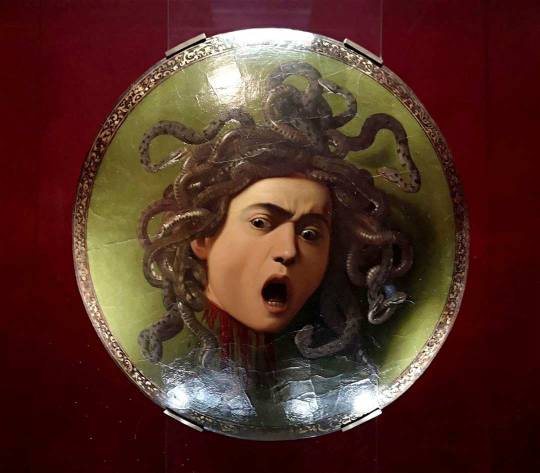
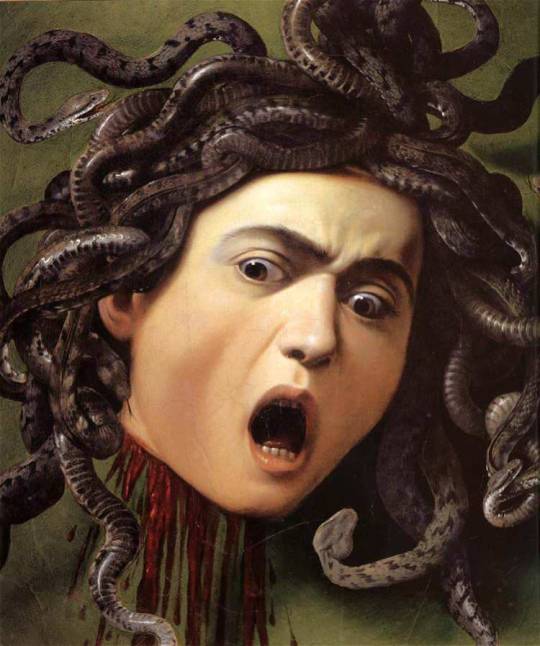

Caravaggio painted his Medusa onto a convex wooden shield, and it could still function as a working shield today! He did this for several reasons. One was simply because this was what Da Vinci had done before him, and he was imitating the design of the great Renaissance master.
Another reason ties in with the Greek mythological tale of Medusa, and the reflective shield Perseus used to help him find her without looking her in the eye. Caravaggio might also have painted Medusa onto a shield because he had heard a story about how Da Vinci once painted a shield for his father with a realistic array of snakes, lizards and monsters.
Caravaggio was quite an interesting character...

Actually he sounds like an asshole. An exhibition of documents at Rome's State Archives throws vivid light on his tumultuous life here at the end of the 16th and the beginning of the 17th centuries.
The documents provide a completely new account of his most serious brawl in May 1606 in which he killed a certain Ranuccio Tommassoni.
Some biographers have suggested that there may have been an argument over a woman, but the text of the court report suggests the quarrel broke out over a gambling debt. Caravaggio killed Ranuccio and fled the city. (details are attached to his portrait above)
Anyway... a few more paintings:

Caravaggio | The Beheading of St. John the Baptist (1608)
The highly dramatic painting, The Beheading of St. John the Baptist, still resides in the locale for which it was commissioned. Located in the Oratory of the Co-Cathedral of St. John in Valletta, Malta, this painting depicts St. John being held on the ground while blood is gushing from his neck. Salome waits nearby holding a golden platter, while another woman watches in horror as the scene plays out.

Caravaggio | The Taking of Christ "Presa di Cristo nell'orto or Cattura di Cristo", 1602
A painting, of the arrest of Jesus, commissioned by the Roman nobleman Ciriaco Mattei in 1602. Featuring seven figures, all of which fill out the majority of the composition, the painting, once again, showcases Caravaggio‘s skill in using light and dark to create a bold (and in this case, claustrophobic) work.
#art#renaissance#caravaggio#medusa#mythology#greek mythology#Michelangelo Merisi da Caravaggio#cliff clavin#john the baptist#taking of Christ#Christ#Jesus
204 notes
·
View notes
Text
I don't think Greek Mythology retellings/adaptions/inspired/etc. are necessarily "evil"...but I DO think people REALLY need to understand that there's a huge difference between the actual mythology and certain media.
I feel like people have to basically do a "Fandom ___" to say the different versions. Like "PJO ___", "Hades game ___", "TSOA ___". For it to be understood that these depictions are DIFFERENT. I'm saying this as someone who grew up reading PJO and still has a soft spot for it. But as someone who really loves Greek Mythology as well, I sometimes get really SAD.
I'm going to use the comparison of Howl's Moving Castle with it's Book Vs. Movie. I enjoy both!!! But they are honestly very different. In the movie there is no "sister swap", Markle isn't a young teenager, Sophie doesn't throw weed killer at Howl, and many more moments. But I enjoy both because even though there are changes they still keep components that are ingrained into the characters!
In some Greek Myth retellings/adaptations/stories/etc., characters are...SO different from the source material. That's fine...Choose what you want with your story... But folks should know that the modern adaptations are NOT the source material!!!
It bothers me that a lot of these wonderful myths and stories are twisted up and seen so differently because of a modern version of them. You can have that character be "awful" or a certain way in your story. But I almost feel that as fans, it's not good to generalize them or see it as "This is the truth". People are hating the mythological figure when it's only in that interpretation they are like that.
In PJO, Ares is "Zeus' favorite", isn't a good dad, a misogynist, etc. The actual myths? One of his Epithets is LITERALLY "Feasted by Women", in the Iliad everybody basically bullies him with Zeus literally saying he hates him. He cries when he learns one of his sons is killed in the war. He literally kills someone about to rape his daughter. Ares isn't perfect but it makes me sad with how he's viewed and talked about when it's only in PJO he's like that. Same with Dionysus. Read the Bacchae, you'll love it.
In Lore Olympus, Apollo rapes Persephone (noticing the fact that modern takes on the myths add rapes where there never were hmmmmm) when he never did in any of the myths.
In TSOA, Thetis is cruel when in the Iliad, she is such a loving mother to Achilles. She grieved alongside her son over Patroclus. Also with Agamemnon. In Ipheginia at Aulis, Agamemnon is a MESS. He adored his children.
In Circe, Odysseus is viewed as a selfish man who ONLY hurts others and doesn't care about his family when that is LITERALLY his one consistent character trait. HE is actually the one who is the victim of rape. Circe was never raped.
Medusa is only a victim in Ovid's, a Roman man, works. Not in GREEK mythology. She was just a cool monster. Leave Perseus alone. Poseidon and Medusa actually had a consensual relationship in Greek Mythology!
These adaptations/retellings/inspired by/etc. whatever anybody wants to call them, are not the real myths! They may be similar in some ways but to just generalize them or hate the deity/mythological figure because of something they did in the new media feels fucked up!
You can enjoy these new stories. There's nothing wrong with that!!! But know they're not the real myths. Maybe even label it as "I hate ____'s version of ____". As that makes it clear what version you're talking about.
#I'm probably wording this very weird. I'm sorry for that haha#idk I'm getting sad#I'm clutching the gods and my special lil heroes to my chest to protect them from the hate.#this is silly but...idk had to say it :(#anti circe#anti madeline miller#sorry but that book makes me the sad™#greek mythology#tagamemnon#Mad rambles#shot by odysseus#PJO is special to me but I'm protecting the Gods >:( They can suck in PJO. to say the suck in the myths when you don't know the actual#myths is...sad#tw rape#<because so many adaptations ALSO add them when they're not there!!!!#save me morally gray circe#essay
97 notes
·
View notes
Text

Medusa, the OG stonergirl 👁️🪨 Almost all of us are familiar with her legendary petrifying gaze. It is mentioned in the earliest records of Medusa and her monstrous gorgon family. What is also mentioned in ancient texts by 500 BC is that unlike her immortal family, Medusa was mortal as well as remarkably beautiful. The origin story of how she got her defensive power comes much later from the Roman poet Ovid during the turn of the common era. Yep, dude lived through the turnover from BC to now times. Ovid wrote that Neptune found Medusa in a temple to Minerva, goddess of war and intellect, and forced himself upon her. When Minerva found out, Neptune blamed Medusa for coming on to him. Because Medusa was a gorgon and not a fellow god like her uncle Neptune, Minerva chooses to punish Medusa by giving her a gorgon figure like her sisters, with snakes for hair. 🐍 As a result of the betrayal, Medusa’s gaze turns men to stone. Relatable to sexual assault survivors, Medusa has become a symbol of righteous rage for many feminists. We can understand Ovid’s version as a critique on power when we look at history and realize that he was in resistance to political corruption in ancient Rome.
Obviously, and sadly, this critique’s relevance to society both predated Ovid’s time and has followed into modernity. Ovid’s myth shaping also demonstrates how storytelling and art can shape historical and mythological memory in society, how concepts of divinity and the personas projected upon these divine forces in the form of gods are forged from human imagination in order to make sense of not just the workings of nature but of relationships within civilization.
An an artist I have taken my own liberties with the Medusa myth in self portraiture. Playing with the “stoning” powers of Medusa’s gaze, I’ve drawn a “stoner” tattoo on her wrist as she burns one down. This is also in acknowledgment to the Ovidian origin story in which Medusa is explained as an assault survivor with a nod to how cannabis has been a clinically proven medicine for PTSD in association to such experiences and yet remains often vilified similarly to Medusa.
https://misspjsuperior.etsy.com/listing/1588503886
#medusa#digital painting#greek mythology#ovid#csa survivor#cptsd recovery#sa survivor#stoner goddess#stonergirl#snake hair#art of legends#magic the gathering#cannacommunity#crazy eyes#medusa gorgon#trauma response#ganjagirls#420culture#legend of Medusa#Medusa myth#feminist mythology#procreate#how to paint light#chain collar#red light
44 notes
·
View notes
Text
Rape in “Greek” mythology
I thought I made a post about this before, but I can’t find it back so... either I did and it got lost, or maybe it disappeared X)
So... Greek mythology has a big reputation for being full of rape. And I am not saying that there isn’t any rape in it - there are rape stories in Greek mythology. BUT... there might not be as many as you believe. Because the thing is that there’s a lot of rape in ROMAN mythology, and given people got a lot of their info about Greek mythology from writers who are actually talking about Roman versions of the legends and the myths... this leads to some confusion.
But the prominence of rape in the Roman version of the myths, compared to the Greeks, is exemplified by Ovid. Ah, Ovid. Everybody knows his Metamorphoses. He was to the Romans what Hesiod was to the Greeks, the same way Virgil was the “new Homer”.His rewrite of Greek myths into Roman literature not only became a foundation of Roman mythology, but also became one of the main sources of “Classical” mythology for both the Middle-Ages and the Renaissance Europe. When you said “Greek myth” people pointed out Ovid as their main source.
The problem being that Ovid wrote essentially Roman legends. Yes he took Greek myths, but he did more than just changing the names: he actually rewrote the stories. And one of the things he did was adding rapes. Lots of them. I am not afraid to say in a jestful but sincere way that Ovid might have had a rape fetish.
The two most prominent examples are two of the unfamous rapes of mythology: Medusa and Callisto. In Ovid’s story, both women are raped by gods and both women are punished for it. These stories were heralded as the epitome of the unfairness of Greek mythology. Problem is... in Greek mythology they’re not raped at all. And only one of them is punished.
In Hesiod’s texts, Medusa seems to have a consensual relationship with Poseidon (and quite a pleasant one at that, with them lying in beautiful beds of flowers and all that), and there is no talks of rape. And the whole story of Medusa being a mortal woman punished by Athena/Minerva for being raped in her temple was COMPLETELY invented by Ovid. In Greek mythology, Medusa was a monster since birth, born out of gods well-known for birthing evil monsters (which notably explains why her being the “only mortal of the Gorgon sisters” is treated as a big deal, as her mortality is a literal anomaly in her divine family).
Callisto’s case is eerily similar. Ovid wrote that Zeus tricked her first by turning into Diana/Artemis, and then explicitely raped her, forcing himself onto her. But in Hesiod’s text, Zeus is said to have “seduced” Callisto - AND the text says their affair actually went on for quite some time, only stopping when Artemis noticed that Callisto was pregnant. Nothing about any kind of rape.
So... two cases of consensual relationships and romances in Hesiod that were turned into brutal rapes by Ovid.
And should I point out that so far I only found the story of Eurydice dying because she tried to avoid being raped in Virgil’s texts - aka another big Roman writer whose texts reinvented Greek mythology and later helped build the Roman mythology?
Once more, I am not saying Greek mythology was devoid of rape. But I do say that the Roman versions of the myths added rapes everywhere and turned a lot of consensual relationships into rapes.
#greek mythology#greek myths#rape#medusa#callisto#eurydice#ovid#virgil#roman mythology#roman myths#rapist#greek gods#roman gods
214 notes
·
View notes
Text
i have so many thoughts ab pjotv changing the medusa stuff,,,
the conversations were amazing. they were insightful and i lovedd them so much.
implying medusa's story is the version she was raped in annoys me cause. it was the roman version, by ovid. but i can get why they did it, cause plot, and maybe the mythic world can adjust itself to whatever the most popular version is with mortals??? thats what im choosing to believe anyway just for. My Sake
grover crying over uncle ferdinand made my heart hurt
medusa just having the statues out in the open ? how does she lure ppl in
let a woman be a monster without a sob story. but also the backstory was good and made sense with the plot and implications. but also let her be a plain monster
also
PERCY SAYING HE CHOSE ANNABETH CAUSE HE COULDNT SEE THEM AS FRIENDS??? AFTER ANNABETH WAS LOOKING AT CANDY TO SURPRISE HIM AND GROVER ???? sobbing
HIS LOYALTY FLAW IS SHOWINGG he chose grover cause he fully trusts himm
grover wearing,, The Shoes,,,,,,,,,
#the show is giving everything more depth and meaning plus foreshadowing#the books are better imo 4vr&always but they focused differently than the show#i think both are good for their respective mediums i just wish the show was paced better#pjo#pjotv#percy jackson#annabeth chase#grover underwood#medusa pjo#coralpost
25 notes
·
View notes
Text
Man, it's wild how badly people have misunderstood the Medusa myth. It drives me wild that people keep getting tattoos of her, and it's now synonymous with protecting SA victims despite the fact that TUMBLR MADE THAT SHIT UP.
Long winded Rant/Explanation below:
Basically, in the original myth—Medusa was always a monster. She always had snakes for hair and the power to turn people to stone.
(BTW, Medusa has wings. That's why Pegasus is a winged horse. I feel like not enough people acknowledge this—)
She was not cursed nor punished—she and the other Gordon sisters just... looked like that because they were the daughters of ocean deities.
She was pregnant at the time of her slaying, hence why Pegasus, her baby, pops out when she is killed.
Now—her pregnancy is never explained in the original myth. She just is, and this was fine because Medusa overall is actually closely meant to be symbolic of a figure of fertility. That's why her hair being a twisting mess of snakes and her accessories being snake themed is important. Tangled up snakes are a symbol of fertility (if you don't know why, it's cause that's how snakes mate).
Perseus killing her is very symbolic of and mirrors the fact that by successfully killing Medusa, he saved his mother from being SA'd by the king. This is also why her depiction shifts from being a monster to being a beautiful woman. It better emphasized that she is meant to be a symbol of fertility—and her beauty goes on to become a very intentional narrative.
Medusa being beautiful places her in a more sympathetic light and is meant to display how victimizing women hurts everyone. Medusa is killed in her sleep and Perseus is a coward who can not bring himself to hurt Medusa head on but has to in order to save his mother, and Medusa is a beautiful woman who is harmed by the King's Greed. No one really wins.
Of course—the sleeping version wasn't as popular because it makes Perseus seem not like a clever hero. Hence, most people are familiar with the versions where he kills her with the mirrored shield. I prefer the sleeping version because it's from a narrative meant to be more woman-sympathetic.
ANYWAY.
The popular modern notion of Medusa as a symbol of SA that was made up on tumblr acrually combines the misogynistic Roman version and the more woman-sympathetic Greek version.
See, there's actually NO version where Medusa was SA'd.
The closest we have was a version written by a roman man named Ovid—Ovid hated nothing more than women.
He (and much of the Romans tbh) HATED the notion of an unwed mother. So, in his version, he writes that Medusa was a beautiful woman who had consensual sex with Poseidon and is punished for defiling a temple. This version is meant to make her punishment justified. She's punished by being transformed into a monster—her hair is made into snakes, and she is no longer allowed to look at men, turning them to stone. A punishment for her promiscuousity (note: Medusa only turns men to stone, btw. This is a whole allegory about ~ dangerous whorish women ~ who bring men down). This is entirely meant to be a reasonable and justified punishment—and her death is also meant to be a justified and reasonable punishment.
The interpretation of her being SA'd comes from a mish-mash of the Greek and Roman versions—where Medusa is supposed to be a victim in the Greek version but a whore in the Roman one. So you end up with... a story where an SA victim is punished for being SA'd.
And that story, which is VERY modern and VERY recent—like it popped up during the 80s and 90s—is the one everyone keeps repeating.
I hate it.
21 notes
·
View notes